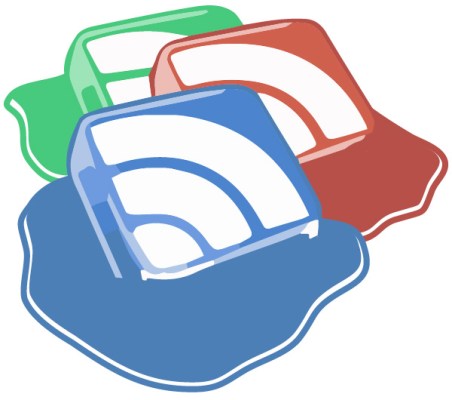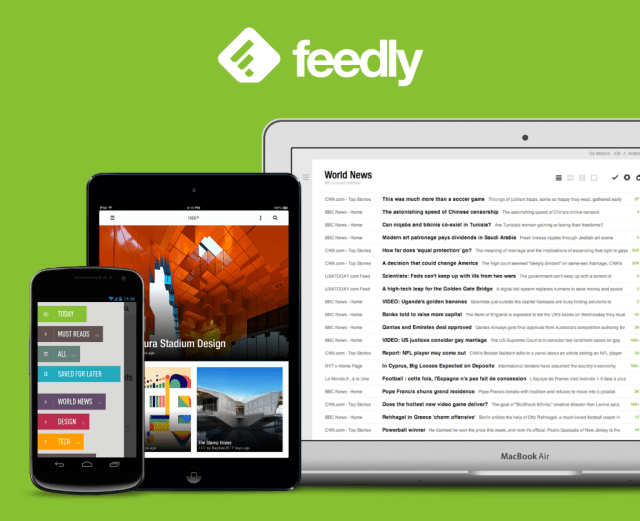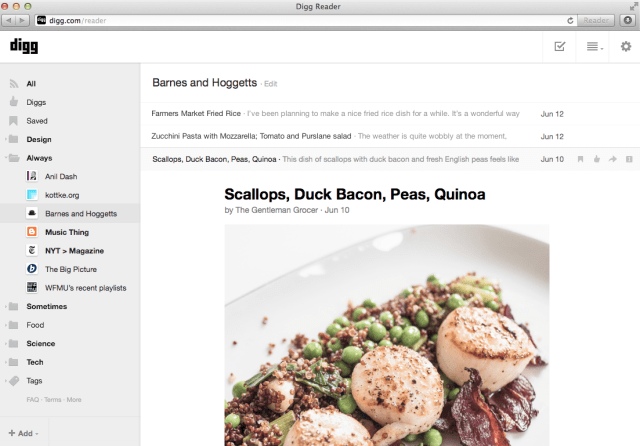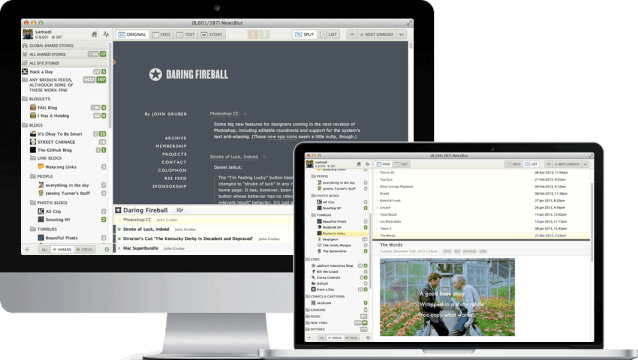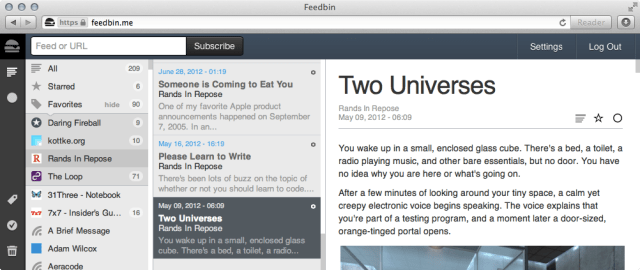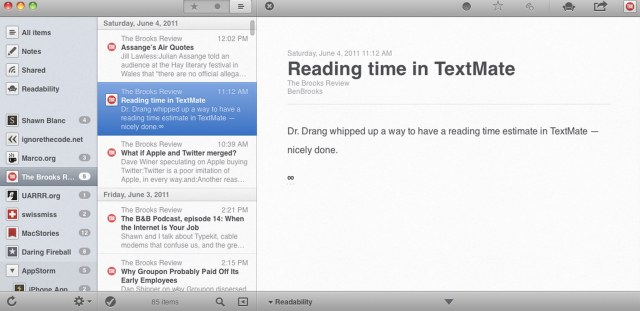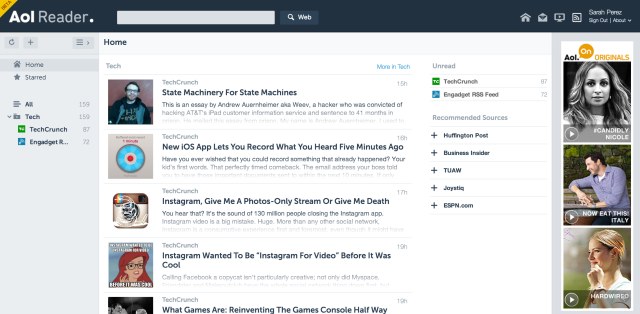Google Reader is slowing down. Over the past few days, buttons have broken, marking feeds as read seemed to take a bit longer than usual, and the Android mobile website on some devices shifted over to the desktop view with no way to change things back. As users up until the bitter end, we can no longer complain about these events because Google doesn’t care – it’s shutting down Google Reader on July 1 and we all have to leave.
It’s the digital equivalent of bringing up the house lights when the rock concert is over. You don’t have to go home, folks, but you can’t stay here.
No one cares about RSS feeds, except for maybe 50 million of the Internet’s most voracious news readers*. Journalists, bloggers, programmers, technically savvy IT workers, researchers, students, startup founders, and anyone else who has grown accustomed to a simple product that lets you – not algorithms or tweets – be in control of which news sources to track and which stories to read.
In the wake of the impending shutdown, a number of alternatives have sprung up to offer a “replacement” for Google Reader. Though some come close, none have completely nailed the experience yet.
*50 million: Digg’s estimate of those who care about RSS.
The Only Real Contenders So Far: Feedly & Digg
Feedly
Feedly has been building its RSS product for years, which gives it a huge head start in this space. Last week, it announced a reach of 12 million users as it officially launched “Feedly Cloud,” a backend infrastructure to power the ecosystem of RSS reader client applications like Reeder, Press, Nextgen Reader, Newsify, gReader, and more, left abandoned by Google’s exit from RSS. These apps had only offered a front-end RSS browsing experience, which means they needed someone else’s API to function. Feedly is one of the few to step in and serve that need.
Why Feedly: Google Reader users will love Feedly because it comes closest to mirroring the Google Reader experience, and it offers a number of settings that can be tweaked to your liking. The service’s “Titles Only” view (which can be set globally in Preferences) offers the same sort of compact view, perfect for headline-scanning action, that Google Reader once provided. It also supports a number of Google Reader’s features, including support for many of the same keyboard shortcuts, tagging, favorites (“Saved for Later”), and “Mark as Read” functionality to quickly plow through categories.
What’s wrong: Feedly currently pulled out its “search” functionality, which lets you pull up content by keyword or topic — something that’s one of the top user requests today. That’s still in the works, the company says, but it’s a big undertaking to deliver upon. In addition, though the company offers clients for web and mobile, the mobile apps are still somewhat over-designed with big, colorful category headers instead of the basic list of folders like Google Reader.
That being said, it’s hard to find a lot of fault with Feedly, and the company is quickly working to add the few missing pieces. There will be little things here and there that you’ll need to get used to, of course (like the “t” shortcut no longer lets you tag items, but rather tweets them). However, in some cases, they’re changes for the better (like the option to set the default view by category).
Digg Reader
Betaworks’ quickly built take on Google Reader is the new kid on the block, and has a lot of potential to be a viable Feedly competitor. Though initially, the team has been working to launch something that offers the core RSS reading experience, the plan is to bring the RSS reader into the modern age by alerting users to what’s most popular among their network and better connect users with Digg.com. In Digg Reader’s “popular” section, the service scans your feeds and then ranks them with one, two or three dots to help you discover trending articles. In practice these recommendations were hit or miss at times, but the beta build we’ve been testing is unfinished.
Why Digg Reader: Like Feedly, the app lets you organize content into folders, view unread counts, move around with Google Reader shortcuts, save posts for later, and share to social networks. With the above-described “Popular” section, it also offers something similar to Feedly’s “Today” for an at-a-glance list of what’s trending. Ex-Google Reader users will also appreciate Digg Reader’s minimalistic look-and-feel, which is almost entirely black, white and shades of gray (outside of the RSS content itself).
What’s Wrong: Most of what’s wrong with Digg Reader is a function of time: The team had a limited number of weeks to build this service, having only started after Google’s shutdown announcement went live. That being said, there are still a number of features that ex-Google reader users likely relied on that aren’t ready in the new reader’s product at launch (planned for this Tuesday). Search is also missing here, for example, as is the ability to tag content or share to other social services beyond Facebook, Twitter or Digg. (“Read later” services like Pocket, Readability and Instapaper are supported, however.)
Digg Reader offers just two views, “list” and “expanded.” While the former is meant to give users a headline-scanning option, Feedly’s “Title Only” view is even more compact, which means its more like Google Reader’s “compact” view.
At launch, Digg Reader will have an iOS app, but the Android version will not be ready for another few weeks.
The Startups
Offering a full Google Reader replacement is no simple task, so it’s notable that some startups have tried to take on this job without the resources of a larger company like Facebook or Betaworks behind them. That being said, for power users of Google Reader, none of these smaller companies will be able to replace what is about to be lost.
NewsBlur (unlimited feeds, $24/year): This cross-platform news reader offers Reader import, compact views, saving stories, and even an interesting “training” feature that’s meant to help teach the reader what sorts of stories you like best. But NewsBlur’s interface is too busy and cluttered, it lacks search, and can be slow when you have a lot of feeds to load.
Feedbin ($2/month): Feedbin’s paid web app is another good alternative for tracking feeds, viewing unread counts, subscribing and tags, and it uses Reader-like navigation via keyboard shortcuts. However, while it supports Reader data import, it lacks a number of key features like search or Feedly’s wide variety of layouts. But most importantly, it’s not a fully cross-platform product on its own. If you use Feedbin on the web, then to keep data in sync across mobile, you’ll need to use an app powered by its API like Reeder, Press, Favs, Tafiti, or others, or beta test the newer Feedbin Reader for Android.
The Old Reader and Hive (previously HiveMined): These two startups sounded promising in theory as both are focusing on simply rebuilding the original Reader – the former working to bring the social aspects back, as well. Unfortunately, neither of these have made it yet, and won’t be solid replacements by the time Google Reader shuts down.
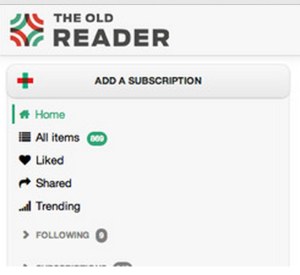 Both apps have issues with speed at times (The Old Reader is far better on this front than Hive, though). Though The Old Reader does have search, it’s title-only, not full keyword search. Hive meanwhile has no search, and struggled to import Reader subscriptions. Sometimes Hive’s buttons are so slow to register clicks that you’re unsure if the app has gone down. Sharing to outside services is either limited or non-existent. Neither service offers a mobile app.
Both apps have issues with speed at times (The Old Reader is far better on this front than Hive, though). Though The Old Reader does have search, it’s title-only, not full keyword search. Hive meanwhile has no search, and struggled to import Reader subscriptions. Sometimes Hive’s buttons are so slow to register clicks that you’re unsure if the app has gone down. Sharing to outside services is either limited or non-existent. Neither service offers a mobile app.
Reeder (paid): Until recently, Reeder was not a Google Reader replacement, it was only the front-end interface for viewing feeds hosted by Google. Since the Reader shutdown announcement, the company said it’s now making plans to continue development, but this involves major changes on its part. Today, Reeder uses Feedbin and Feedly’s APIs on mobile, and is also working to support standalone RSS (introduced in the iPhone app, but not yet the iPad or Mac apps). Because Reeder was built on top of others’ infrastructure, it’s not ready to replace Google Reader at this time. That said, it is one to watch given it has an engaged Apple user base and some traction.
NetNewsWire: Released just today, a beta build of NetNewsWire (ver. 4, beta) became available, and it sports a number of Google Reader-like features, including keyboard shortcuts, limited sharing options, favoriting, mark as read functionality, and more. However, it defaults to an inbox-like view, and its mobile client apps are only for iOS, and not yet updated to the new iOS 7 style.
The Rest: Me-Too’s, Flipboard Alternatives And Aol’s Disastrous Attempt
Ever since the Google Reader shutdown announcement, our inboxes have been filled with pitches for “replacements” nearly every day. It would almost be a disservice to TechCrunch readers to list these here, because real replacements are huge investments in infrastructure and APIs and show an attempt to honor the needs of Google Reader refugees with features like compact views, keyboard navigation, tagging and search. Simply offering an RSS-based product DOES NOT make a service an alternative to Google Reader, and attempting to position it like that is band-wagon jumping at best and dishonest at worst.
Many of these pitches look cobbled together overnight as weekend projects. None are any good. (And yes, I got your email.)
Also, several of these “me too” products tend to look more like watered-down versions of Flipboard, not Google Reader. Really, if you just want a news magazine, use Flipboard then, or wait to see what Facebook has in store with its forthcoming “newspaper for mobile” product.
Aol Reader
Even Aol (disclosure: TechCrunch parent) bungled its RSS reader debut, and launched a product that the lot of us here at TechCrunch can’t even get to work properly. Aol’s RSS reader claims to offer Google Reader import, but refuses to upload Google Reader’s XML file in a multitude of browsers, according to several of us here who gamely tested the service anyway.
Aol’s Reader had intermittent issues in Chrome especially this morning, refusing to ever add the TechCrunch feed, for example (thanks Aol), and taking a good 30 seconds or so to do the same in Safari. This slowness may have been a launch bug, but it wasn’t promising. The reader is also missing search, but does offer tagging, limited sharing, favoriting, four different viewing options (which are suspiciously identical to Feedly though), and oh, giant Aol On Originals video ads in the sidebar…
Well, at least they have a monetization plan.
There Is No Google Reader Replacement
In each of the products listed above, and the dozens of those we haven’t linked to which are still promoting themselves as a home to Reader refugees, there are huge gaps in functionality – like Search, for example, which no one has fully fleshed out just yet. Because of this, users will also lose their ability to search and uncover content from older websites which have long since shutdown, taking their RSS archive with them. Google Reader let you time travel into the web’s past, a personal Way Back Machine of sorts. Unless you’ve diligently been tagging or starring this older content over the years, it will essentially disappear into the ether without a search feature like Google’s, which once dug into seemingly infinite RSS archives.
Reader was also more than a web service. It was a mobile website, a mobile app and an API that allowed an ecosystem of RSS clients to flourish.
It was a quantified-self tracker, whose “Trends” section told you about your news reading habits, including which sites you read, clicked, shared and emailed the most and when, and one that kept track of the feeds that stayed fresh or had become inactive.
It was also a discovery service that connected you with friends, let you package bundles of subscriptions and share them, search for content by keyword, and browse through posts that others found interesting. And it was an alerting tool that could track whenever a person, topic or keyword was mentioned on Google News, Blog Search, Twitter or eBay.
For anyone looking for a Google Reader replacement, the saddest news of all is that there really isn’t one yet.
There are only alternatives.
